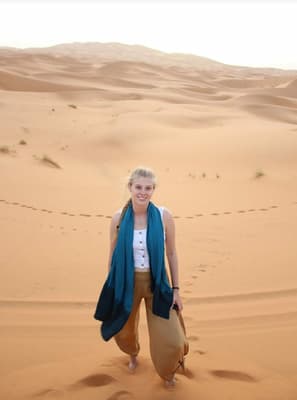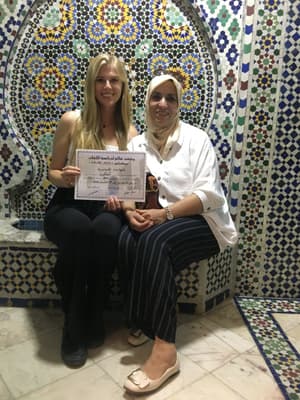Communications Officer Rori DiFiore had the opportunity to speak with 2019 Arabic alumna Emma Tobin on how learning a critical language has allowed her to become a stronger advocate for women’s issues.
Emma talks about growing up as a third culture kid, where her interest in Arabic originated, and how her experiences abroad helped her develop a more nuanced understanding of cultural practices.
Emma recently graduated from the University of Oxford with her Master’s of Philosophy in Development Studies. She plans to use her Arabic language skills and knowledge of the Middle East and North Africa region to contribute to international development, women’s rights, and public health globally.
Rori DiFiore: Where did your interest in learning the Arabic language come from?
Emma Tobin: I moved abroad for the first time with my family when I was twelve to the Netherlands. My parents are from rural Iowa and grew up on farms. I had barely been outside the U.S. at that point and in what felt like overnight I woke up in a different country with a different language. I became a Third Culture Kid. I was an American on my passport, was born in the Midwest, but I had strong ties to Europe and California.
When I moved back to the U.S. in high school, I knew that I wanted to get back out and explore the world before going off to college. I went on a gap year and spent four months in Southeast Asia, volunteering and working in Thailand, Vietnam, Cambodia, and Malaysia. These four months were life-changing. I worked with street orphans and with Thai Hill Tribe groups on women’s health and teen pregnancy.

I realized I wanted to do something in a related field during the second half of my gap year. I ended up going to Marrakech, Morocco for five months and interned at a nonprofit. My homestay was in an impoverished area in Marrakech on the outskirts of town. There were seven of us living in a two-bedroom house. I showered at the local hammam [bath house] with everybody in the neighborhood. As a 5-foot-9 blonde nineteen-year-old, needless to say, I stuck out. I started learning Arabic while in Morocco so that I could begin to understand what was happening around me. My host family didn't speak any English, but my host mother in particular loved me and took care of me.
In addition, I was traveling to the High Atlas Mountains every day and working with rural communities of women who wanted to learn how to read and write so that they could run their couscous farms and provide financial support to their children. I had the amazing opportunity to sit in these rooms where the women would remove their hijabs. They would feed me, and we would sit together. They didn't speak any English and my Arabic was terrible at that point as I had only been learning for about a month. I started having this hunger in those situations to be able to contribute meaningfully, instead of just sitting happily and smiling.
I went back to college knowing that I needed to learn Arabic. I wanted to have conversations with the women who had been willing to give me a part of their homes and their hearts. Communities of women are so important. I realized that if I wanted to do anything to help improve women’s lives, I had to have language skills first. So that's where my Arabic journey started.
When CLS sent me back to Morocco in 2019, I was able to go to Marrakech and see my host mother and have a verbal conversation with her. After years of struggling to learn Arabic stateside, and then returning to Morocco, it all felt worth it. I want to continue to learn as much as I can so I can be there and have crucial conversations with women—to ask women the questions they deserve to be asked.

RD: Wow, it’s amazing to see how through Arabic you were able to access these intimate spaces and have such important conversations. Can you tell us a little bit more about the research you are currently doing?
ET: I recently finished writing my thesis on women and, more specifically, on female genital circumcision (FGC) in Indonesia. I originally thought I would focus my research on a region in the Arabic-speaking world. I studied Arabic for six years and interned with the State Department in Dubai. Ultimately, I decided to push my boundaries of understanding and gain regional expertise in other parts of the world. I decided to stay within Islamic cultures and faiths but pivot to Indonesia. I focused on analyzing NGO advocacy response to FGC legislation. I had many illuminating conversations with FGC advocates across sectors and countries. I addressed questions like: What does it mean to be a woman? What is bodily autonomy? And how do we play a role in this conversation as international advocates and allies on a cultural custom that does not necessarily impact us?
These subjects are much more nuanced and complicated than I think any of us really will ever take time to fully understand. FGC is practiced in so many different parts of the world and the custom has different meanings depending on the region of the world. As a researcher, it was my goal to try to understand what local voices were saying on the subject instead of prescribing what I think should be happening or making assumptions based upon my own cultural beliefs.
RD: I appreciate you sharing the nuances on the topic. What was it like connecting with women across cultures? Did you find a connection that transcended cultural lines?
ET: I’ve been to 46 countries now and a commonality I’ve found is that women are welcoming no matter where one is in the world. My host mother in Thailand was 85 and did not speak a word of English but, at the end of the day, we had so many shared experiences. We understand what it’s like to be women in different parts of the world. When I lived in Morocco, my mom and sister came to see me and met my host mom. They sat down and just through womanhood shared a really beautiful connection. It’s so encouraging to know that, wherever I go in the world, I can find through women a sense of safety and community.
RD: What advice would you give to CLS applicants?
ET: When I went to college, I applied for three years in a row to CLS. I knew it was the scholarship I wanted because I was committed to learning Arabic. I decided I would reapply until I went blue in the face. When I finally got it, I was so stoked. It was something I had been dreaming about for years. It’s important to not give up after applying for CLS. Be tenacious. I thought I was a good candidate every year and I was always disappointed when I didn’t receive it. In hindsight, it didn’t happen then because I wasn’t ready for the challenge. I think that was reflected in my application until after I gained additional experience interning at the United Nations and living in Dubai. I needed to connect more deeply with my motivations for participating in the program and articulating why CLS should support my future dreams.
RD: I really appreciate you being candid about applying multiple times—because we hear that from alumni a lot! What advice would you give to students who will be participating in the CLS Program next summer?
ET: I’d say throw yourself headfirst into everything. It is the absolute best way to succeed. I recommend that all CLS students make use of their homestay families. I’ve had the best homestay moms and I am forever grateful for that. My host mom during my CLS Arabic program made us the Moroccan versions of American pizza because she thought we’d like it. It had tuna fish and green olives on it. It was not great, but she loved me, and she tried. I went to three Moroccan weddings. I pushed myself to do many things outside my comfort zone. It was incredibly challenging. In the beginning, especially, I was silenced in a way I hadn’t been since I was a 12-year-old kid who had just moved to the Netherlands. Once you get over the initial fear of being afraid you will say or do something that will make you look dumb, you’ll start to see how far you can go. I went up six levels in Arabic during my CLS Program.


